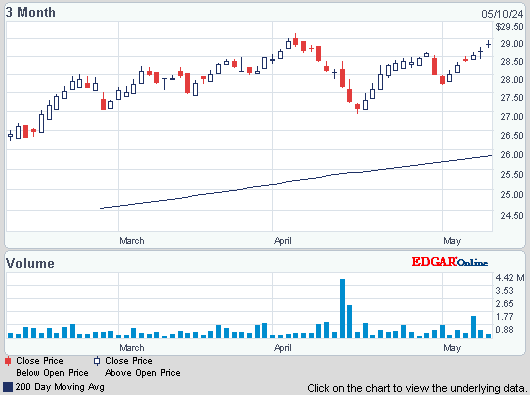Dow jumped another 23, advancers over decliners 3-2 & NAZ gained 16, all on sluggish volume. The MLP index was up 1+ to the 457s (but still flattish for months) & the REIT index rose 1+ to the 266s. Junk bond funds hardly budged & Treasuries slid back. Oil dropped below $93 as a report
on crude supplies pointed to a surprisingly high increase last week. Gold inched up.
AMJ (Alerian MLP Index tracking fund)

The Thomson Reuters/University of Michigan final index of consumer sentiment in Nov unexpectedly rose to 75.1 from 73.2 a month earlier. The forecast called for 73.1 after a preliminary reading of 72. Forecasts ranged from 71 to 75.2. But the index averaged 89 in the 5 years before Dec 2007, & 64.2 in the 18-month recession that ensued.
Michigan Sentiment Index Increased to 75.1 in November From 73.2

Photo: Bloomberg
Fewer Americans than projected filed applications for unemployment benefits last week. Jobless claims declined 10K to 316K, the fewest in 2 months, according to the Labor Dept. The forecast called for an increase to 330K. The data are difficult to adjust for seasonal variations around holidays. Companies have kept workforces lean since the recession & are waiting for more evidence of sustained improvement in demand before they resume hiring. A pickup in consumer spending is needed to help drive growth & boost employment. The 4 week average of claims fell to 331K from 339K. The number continuing to receive jobless benefits dropped by 91K to 2.78M, the fewest since Jan 2008. Continuing claims don’t include those who have exhausted traditional state aid & are receiving emergency & extended benefits under federal programs. Those job seekers rose 3K to 1.3M. The unemployment rate among people eligible for benefits decreased to 2.1% from 2.2% a week earlier.
Jobless Claims in U.S. Unexpectedly Fall to Two-Month Low

Photo: Bloomberg
All news was not good as orders for US durable goods dropped in Oct, reflecting a broad-based retreat & signaling the gov shutdown hurt business confidence. Bookings for goods meant to last at least 3 years decreased 2%, matching the forecast, after a 4.1% gain in Sep that was larger than initially reported, the Commerce Dept said. Orders for aircraft & capital goods, such as machinery & computers slumped. The federal shutdown last month combined with continuing budget cuts have prompted companies to trim staff & close factories, which will weigh on growth. A lack of a rebound in bookings this month will mean businesses are unwilling to investment in expanding amid concern the economic expansion won’t accelerate in 2014.
Durable Goods Orders Drop as U.S. Shutdown Hurts Confidence
Stocks are up again today, but with little conviction because many have already left on holiday. In a more active market, the economic news might have brought out more buyers, although the orders data has cooled some enthusiasm for stocks. The DC fiscal mess drones on & the clock is ticking for the next dead line only a couple of weeks away.
AMJ (Alerian MLP Index tracking fund)
Treasury yields:
U.S. 3-month |
0.07% | |
U.S. 2-year |
0.29% | |
U.S. 10-year |
2.73% |
| CLF14.NYM | ...Crude Oil Jan 14 | ...92.32 | (1.5%) |
| GCZ13.CMX | ...Gold Dec 13 | ....1,244.70 | .....3.30 | (0.3%) |
The Thomson Reuters/University of Michigan final index of consumer sentiment in Nov unexpectedly rose to 75.1 from 73.2 a month earlier. The forecast called for 73.1 after a preliminary reading of 72. Forecasts ranged from 71 to 75.2. But the index averaged 89 in the 5 years before Dec 2007, & 64.2 in the 18-month recession that ensued.
Michigan Sentiment Index Increased to 75.1 in November From 73.2

Photo: Bloomberg
Fewer Americans than projected filed applications for unemployment benefits last week. Jobless claims declined 10K to 316K, the fewest in 2 months, according to the Labor Dept. The forecast called for an increase to 330K. The data are difficult to adjust for seasonal variations around holidays. Companies have kept workforces lean since the recession & are waiting for more evidence of sustained improvement in demand before they resume hiring. A pickup in consumer spending is needed to help drive growth & boost employment. The 4 week average of claims fell to 331K from 339K. The number continuing to receive jobless benefits dropped by 91K to 2.78M, the fewest since Jan 2008. Continuing claims don’t include those who have exhausted traditional state aid & are receiving emergency & extended benefits under federal programs. Those job seekers rose 3K to 1.3M. The unemployment rate among people eligible for benefits decreased to 2.1% from 2.2% a week earlier.
Jobless Claims in U.S. Unexpectedly Fall to Two-Month Low

Photo: Bloomberg
All news was not good as orders for US durable goods dropped in Oct, reflecting a broad-based retreat & signaling the gov shutdown hurt business confidence. Bookings for goods meant to last at least 3 years decreased 2%, matching the forecast, after a 4.1% gain in Sep that was larger than initially reported, the Commerce Dept said. Orders for aircraft & capital goods, such as machinery & computers slumped. The federal shutdown last month combined with continuing budget cuts have prompted companies to trim staff & close factories, which will weigh on growth. A lack of a rebound in bookings this month will mean businesses are unwilling to investment in expanding amid concern the economic expansion won’t accelerate in 2014.
Durable Goods Orders Drop as U.S. Shutdown Hurts Confidence
Stocks are up again today, but with little conviction because many have already left on holiday. In a more active market, the economic news might have brought out more buyers, although the orders data has cooled some enthusiasm for stocks. The DC fiscal mess drones on & the clock is ticking for the next dead line only a couple of weeks away.










No comments:
Post a Comment